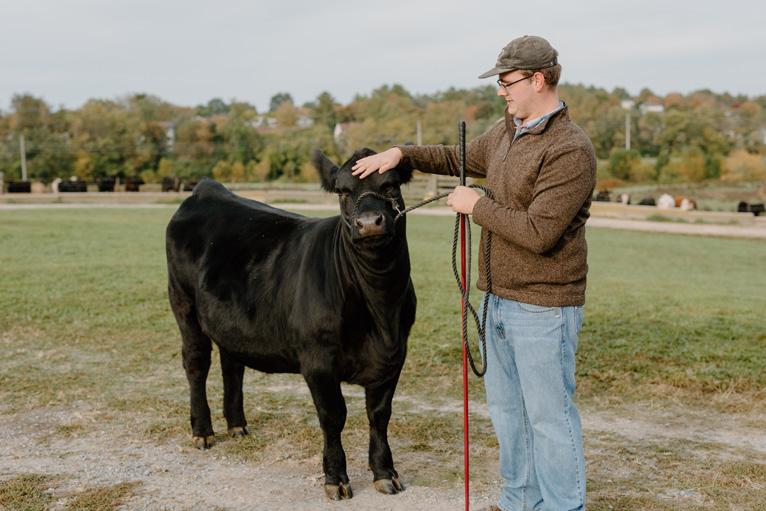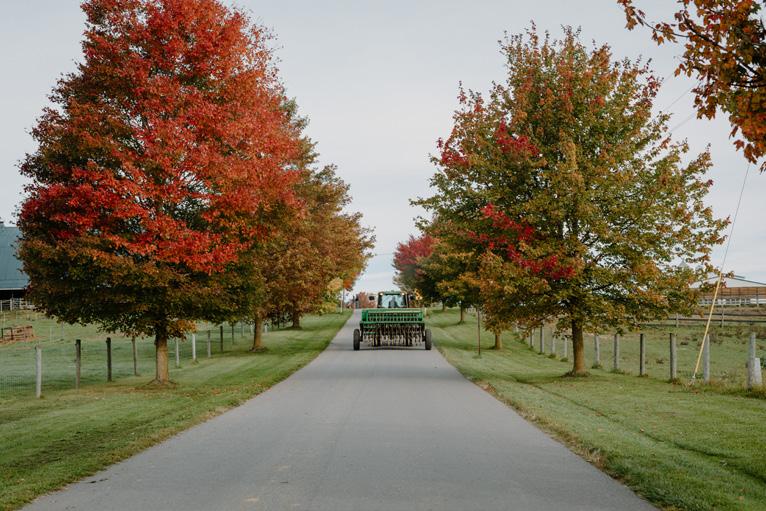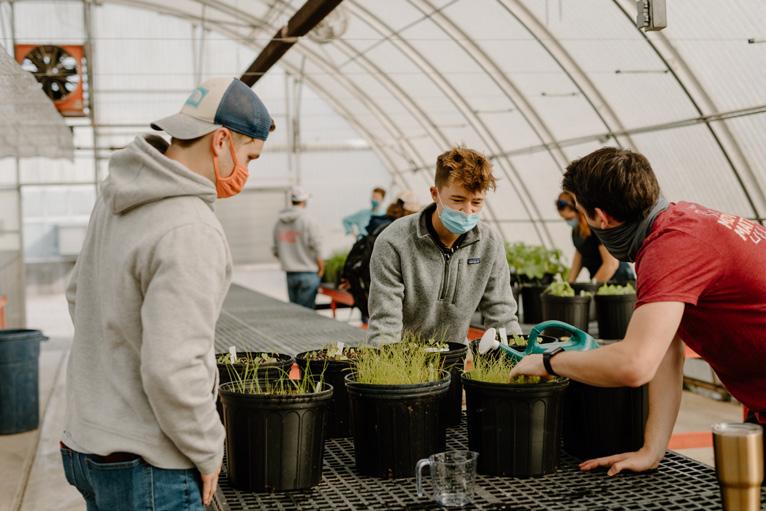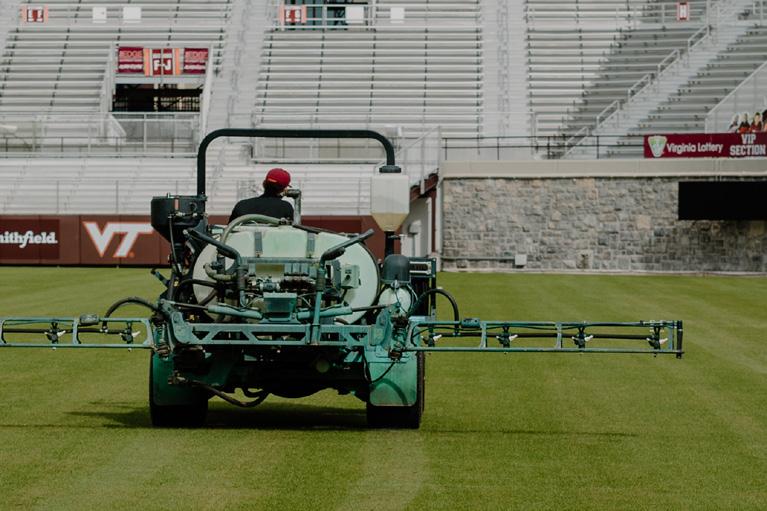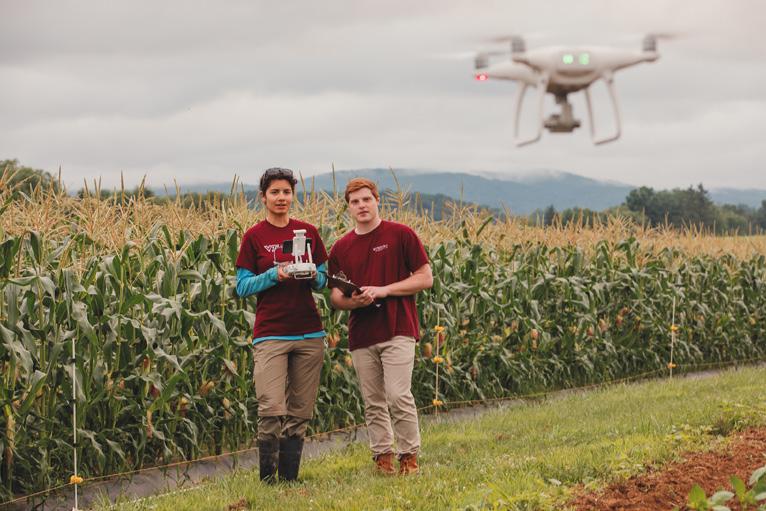
27 minute read
Farmer Favorites
from FBN Nov 2021
— GIFTS FOR GROWERS —
Finding the perfect present for the farmer in your life gets a whole lot easier with your Farm Bureau membership
Holiday shopping for your favorite farmer can be a tall order since many are creatures of habit.
Lots of farmers sport the same worn-in work clothes for years, use tools they’ve trusted for decades, or drive pickup trucks that may have been retirement-ready a generation ago. But, as a Virginia Farm Bureau member, finding the right gift for even the pickiest producers is easier thanks to the benefits that come with your annual membership.
Farm Bureau members in Virginia have access to discounts from brands and retailers such as Case IH, Caterpillar, Ford, Grainger, John Deere and Yamaha, as well as Virginia Farm Bureau Federation’s products warehouse.
With this wide network of member benefits, finding a deal and spoiling the farmer in your life with new farming equipment, tools or an updated wardrobe has never been simpler.
Here are Virginia Farm Bureau’s top 10 favorite items for farmers this holiday season:
Chore coat

Work clothing has become a hot trend in mainstream fashion, but Virginia farmers actually put their attire to the test every day. There are few garments more flexible than a chore coat, and members can find savings on a new one or other work wear at Grainger.com.



Work gloves
Just like a chore coat, a good pair of work gloves serves several purposes. They keep farmers’ hands protected from abrasions and cuts, hazardous materials, outdoor elements and more. Shop for a pair—or three—by browsing the products warehouse at products.vafb.com.
Emergency or first-aid kit
As handy as work gloves are, they can’t stop every nick and scrape. Firstaid kits, as well as kits for weatherrelated emergencies, can be purchased through Grainger.

Virginia Farm Bureau tumbler
Farming is hard work, and everyone knows it. It’s important to stay hydrated, so why not give farmers the option to take their beverage to-go in a Virginia Farm Bureau tumbler? Shop for the tumbler and other home goods on the Virginia Farm Bureau store, which can be found at vafb.com/ benefits.
Upgraded tool set
Farmers often are reaching for tools, and if their set has seen better days, new hand tools or power tools may be in order. Members can save on select tools through Caterpillar, or through Grainger on brands such as Dewalt®, Stanley® and more.

Tool storage
No tool set is complete without somewhere to store it, and members can find savings on toolboxes from Craftsman®, Stanley® and other brands through Grainger.

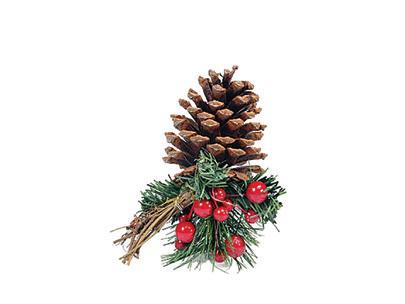
Portable heater
Does your property have a barn, shed or workshop that could use a little more warmth? Keep things heated with a 9- or 15-gallon gas-powered space heater available through the VFBF products warehouse.
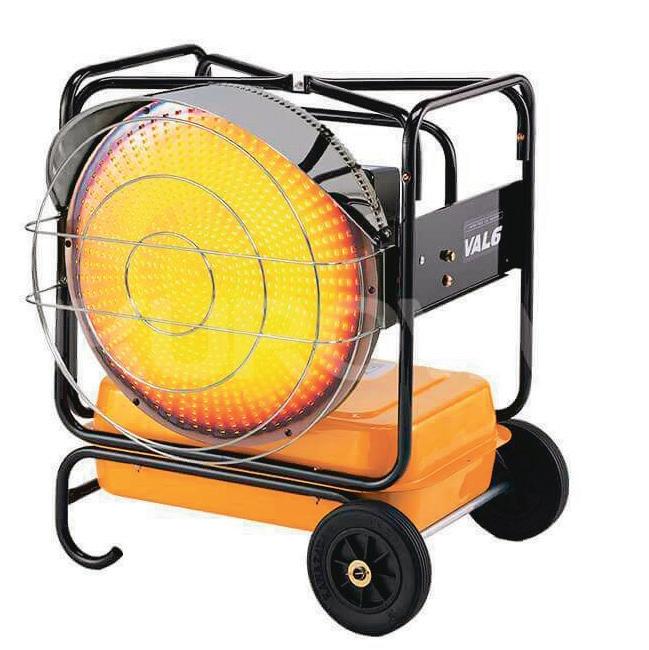
A new ‘sleigh’
What farmer couldn’t benefit from a new truck, tractor or mower from time to time? Members feeling extra generous this holiday season can save on mowers from Bush Hog, tractors from John Deere and Case IH, ATVs and side-by-sides from Yamaha, or a new truck from Ford. Exclusions apply for each, so make sure to study up at vafb.com/benefits.

Virginia’s Harvest hams and peanuts
There’s never a bad time for Virginia ham or peanuts, but the holidays typically are a time for serious snacking. Get your hands on a country ham or sweet and savory peanuts by placing an order online at products.vafb.com/food, or by calling 800-476-8473.
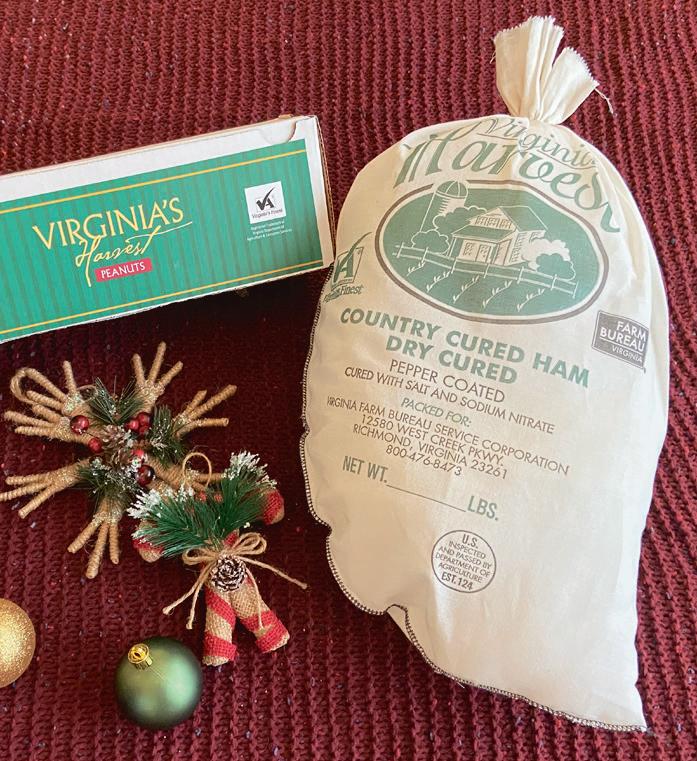
Anything else— they’ve earned it
Didn’t find what you were looking for? No hard feelings! Farm Bureau members in Virginia also have access to Member Deals Plus®, the nation’s largest private discount network. Here, members can access discounts on anything from electronics to travel, dining and apparel, and everything in between.
To find a full list of discounts available to Farm Bureau members through Member Deals Plus®, visit memberdealsplus. accessdevelopment.com and register using your Farm Bureau membership number.
COURTESY OF THE GILLEY FAMILY
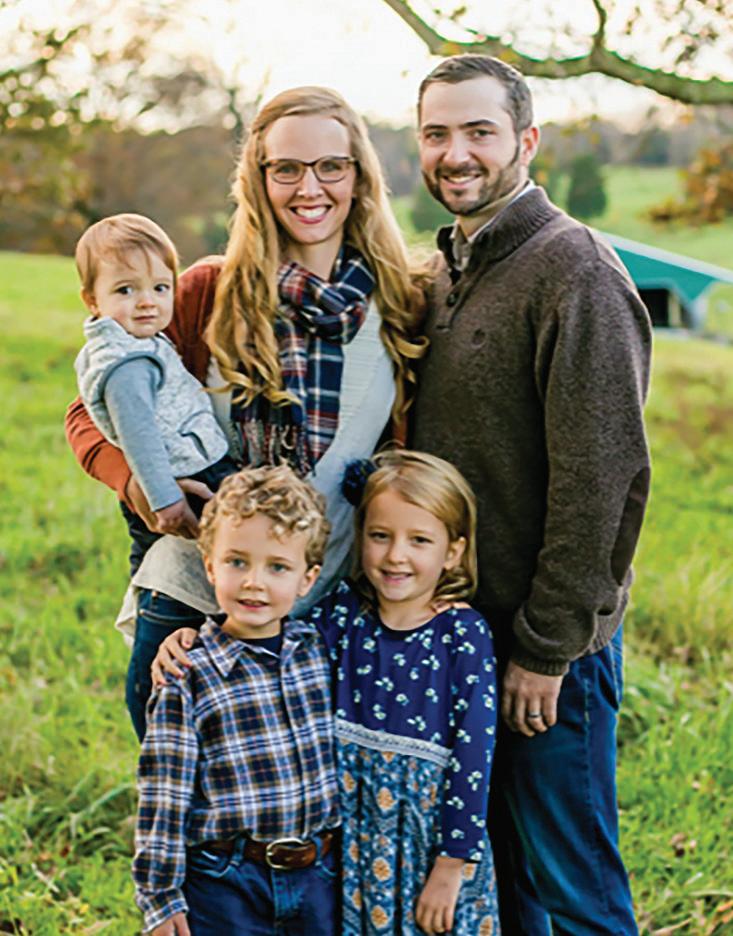
HONEY RIVER FARM
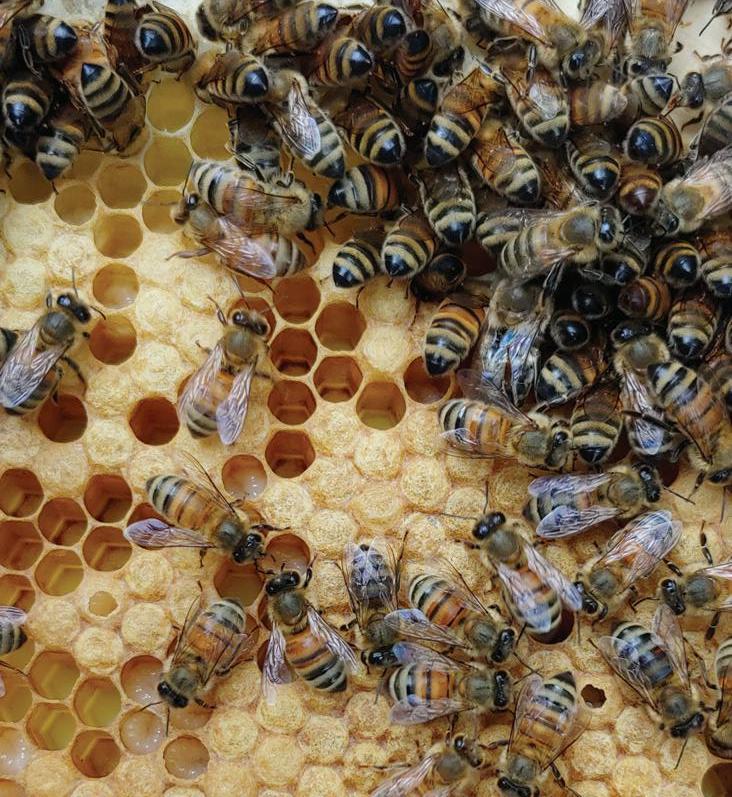
NICOLE ZEMA HONEY RIVER FARM
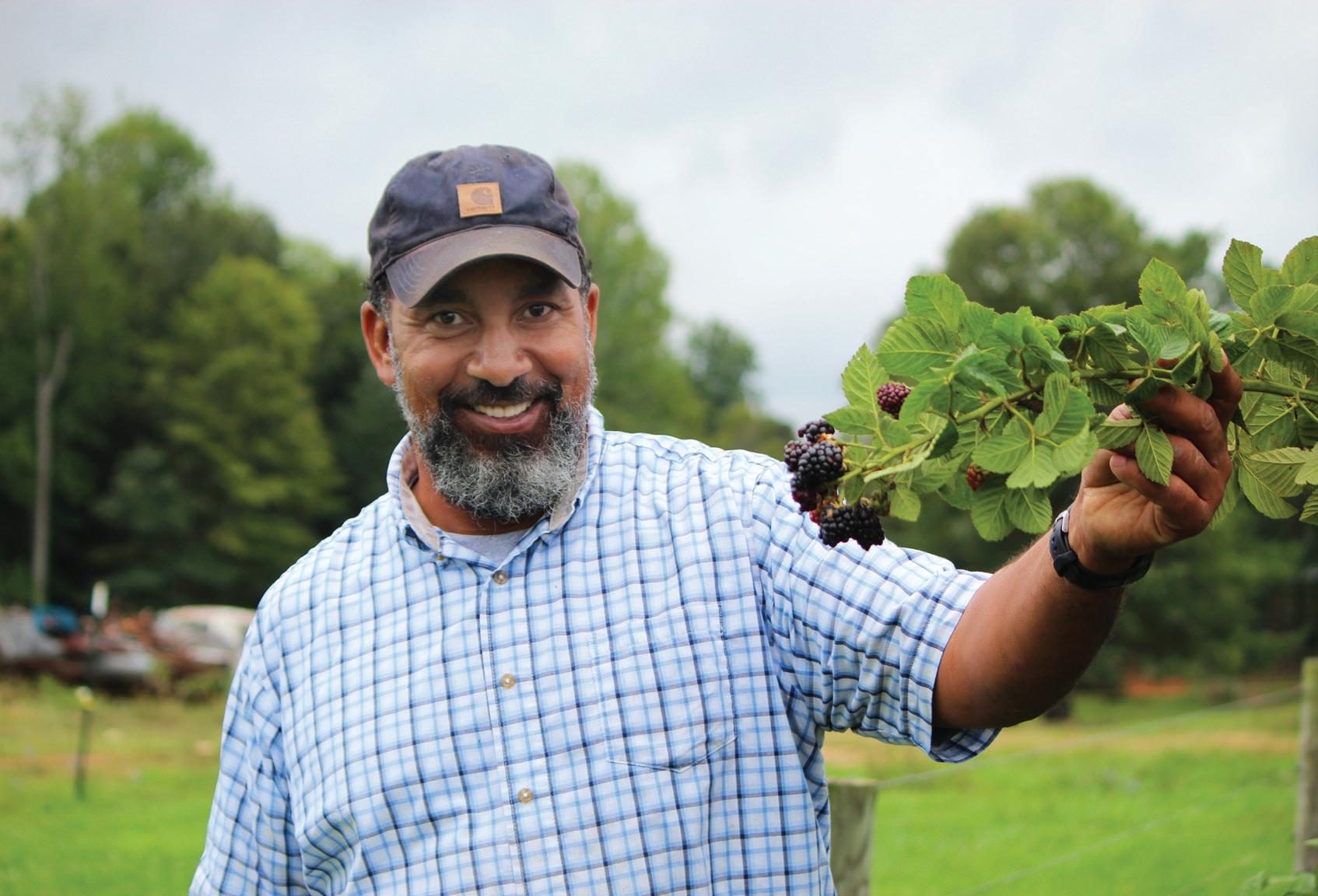
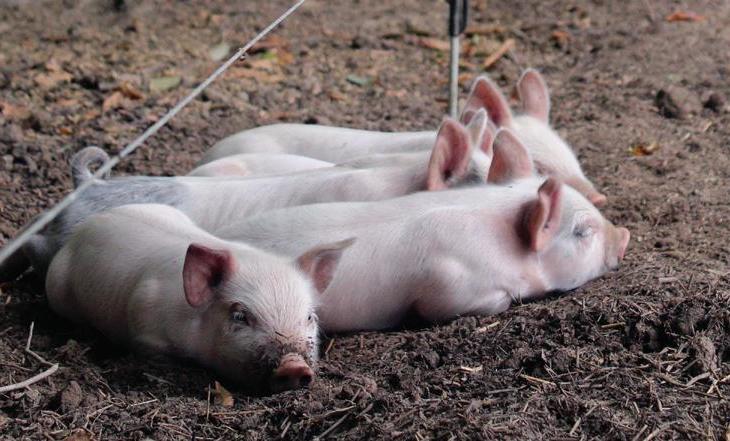
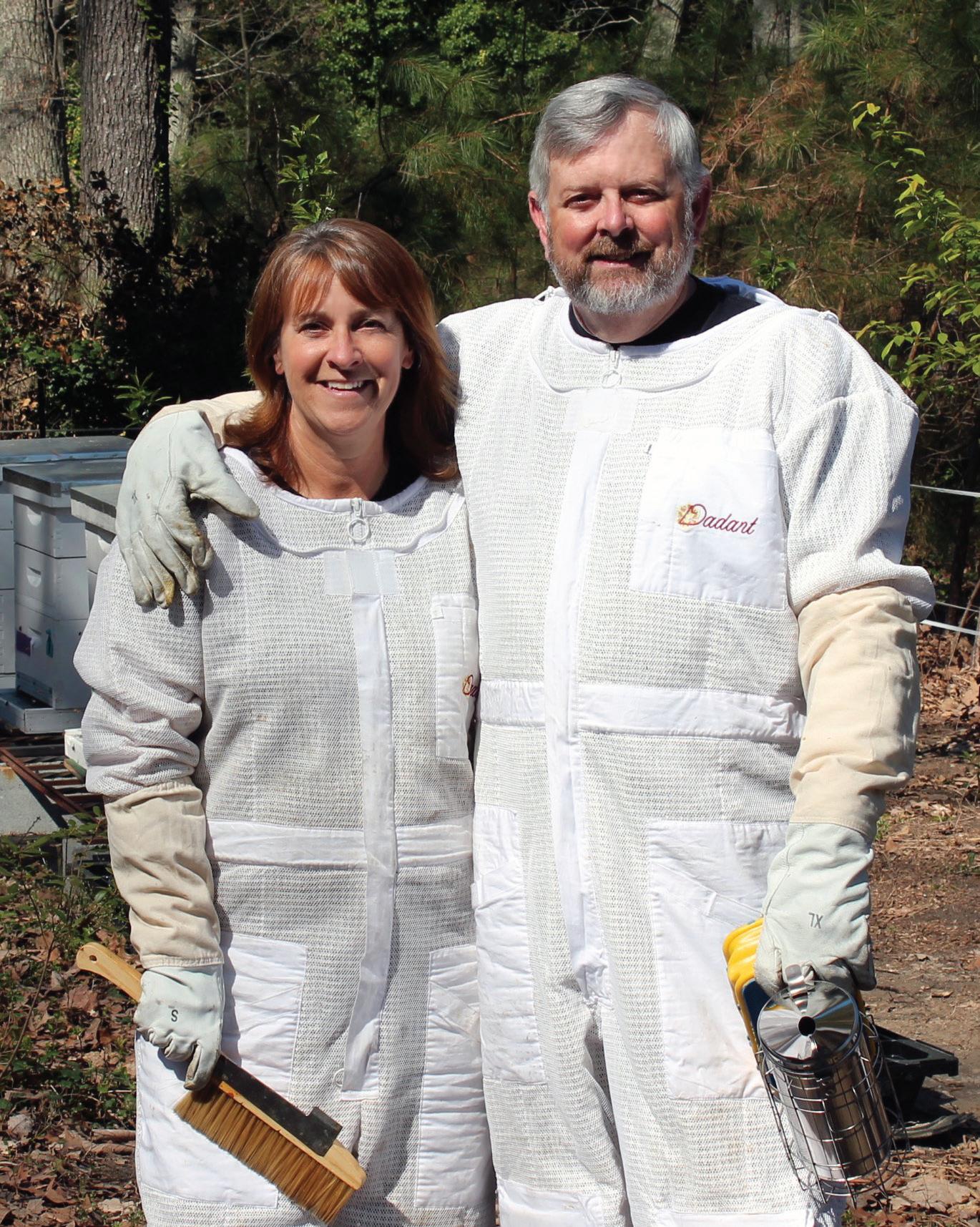
Clockwise from top left: Jacob Gilley, his wife, Jennifer, and their three children operate Heaven’s Hollow Farm in Orange and Madision counties; Cyndi Knudson and Brian Clements of Honey River Farm in Lancaster County are comfortable in their beekeeping suits; Ralph Morton is proud of the blackberries and piglets raised on his Cattle Run Farm in Greene County; and brood larvae work on one of the Clements’ hives.
NICOLE ZEMA
HOME FREE
Veteran farmers work the homeland after years of service overseas
The mission-minded, disciplined and hardworking ethic of military veterans is employed by 9,217 servicemen and -women who are producing agricultural products on 1.3 million acres in Virginia.
Those veteran farmers, as identified by the U.S. Department of Agriculture’s 2017 Census of Agriculture, represent every branch of the armed forces.
In this fourth article in a series exploring diverse segments of Virginia agriculture, we feature three of the veterans who served abroad, returning home with global perspective and renewed love for the land.
Former Army 1st Sgt. Ralph Morton finds joy in new agricultural niches
BY NICOLE ZEMA
Third-generation farmer Ralph Morton of Cattle Run Farm in Greene County stopped by a recruiter’s office on a whim in 1996.
“Next thing you know, I’m in Fort Sill, Oklahoma, for basic training,” recalled Morton, whose two-year enlistment stretched into a 21-year career. He retired as a first sergeant in 2017.
“When I joined the Army, leadership was second nature,” he said. “Working on the farm developed the ability to think independently and work with others. My leaders saw something in me, and I followed their mentorship throughout the years.”
Morton’s deployments ranged from peacekeeping missions in Bosnia, Germany, Kosovo and the Balkans, to the post-9/11 intensity of Afghanistan, Iraq, Qatar, Kuwait and Bahrain.
Morton mentored other U.S. soldiers and also trained Afghan security forces.
“You’re out there in the middle of nowhere in small villages,” he said. “Mountains here are nothing compared to mountains in Afghanistan. I enjoyed it, but it was very, very challenging.”
Home was always a comfort zone, but the end of active duty presented unexpected difficulties.
“Going from 100 mph to about 35 is one of the toughest things I’ve ever had to deal with,” shared Morton, who suffered a traumatic brain injury and post-traumatic stress disorder. “I really struggled just being able to concentrate; I was all over the place. Then I went into shut-down mode, and it started to take effect on the body.”
But Morton found personal peace through veterans’ organizations and agricultural endeavors. He is now volunteer director of the Minority and Veteran Farmers of the Piedmont, an offshoot of Virginia State University’s Small Farm Outreach Program that offers training, technical assistance and financial support on a regional level.
He learned how to grow blackberries at VSU’s berry school, and Morton’s 95 plants thrived on the farm property.
“I was so stoked with them,” he said. “And in the first year we had a bumper crop.”
Morton and his sister, Sarah, have expanded into agribusinesses like a farm Airbnb, retail sales of their beef and pork products, and soon a farm stand.
“I’m in a good place right now, even with the ups and downs,” Morton said. “I like coming out in the mornings after taking the kids to school, going through the raised beds watching stuff grow, working the cattle and riding different routes to check on things. I found that was a big therapeutic piece for me.”
Orange County veteran exemplifies new guard of Va. farmers
BY ADAM CULLER
He didn’t grow up on a farm, but Jacob Gilley learned to love the Virginia countryside when his family visited Madison County, where his parents grew up.
The family vacations to Madison left an impression on Gilley, and he often thought of cultivating farmland. On the other hand, since his father had served 20 years in the U.S. Air
Force, he saw the benefits military service had granted his family—a good life and some money tucked away for his future farming endeavors.
With that in mind, Gilley took a detour on his way to becoming a first-generation farmer.
As a 17-year-old in 2005, he enlisted in the Air National Guard straight out of high school.
Gilley served as an aircraft mechanic and was deployed to Puerto Rico, Germany and Afghanistan before leaving the service as a staff sergeant in 2011. Camaraderie and travel were the aspects of his service he enjoyed most, and the experience left him with a profound admiration for those who serve.
“Being in Afghanistan—I was on the base and was fairly secure— there were many people that faced worse than I did, and sacrificed way more,” Gilley said.
“We’re all veterans, but I have a lot of respect for the other men and women and the roles they served. Every job is important in the military, and there are a lot of days I wish I was still serving for the fellowship, the brotherhood and that sense of pride.”
Thankful for the lessons his military service taught him, Gilley is equally grateful to now be farming with his wife, Jennifer, and their three young children. The family operates Heaven’s Hollow Farm in Orange and Madison counties, living on land that’s been farmed by Jennifer’s family since 1951.
The Gilleys run a cow-calf operation; background cattle; raise hair sheep, feeder pigs and pastured broilers; and market meat and eggs under the Heaven’s Hollow Farm brand. Their products are sold with a Homegrown by Heroes label, which is administered by the Farmer Veteran Coalition and certifies farm products are produced by veterans.
When not on the farm, Gilley also holds the position of mid-Atlantic sustainable grazing manager with American Farmland Trust, working with Central Virginia farmers to improve sustainability practices. Additionally, he is president of Orange County Farm Bureau.
He and his wife also represent District 7 on the Virginia Farm Bureau Federation Young Farmers Committee, a group Gilley said he is “indebted to” thanks to past successes in the committee’s Discussion Meet competition.
U.S. Navy veteran ventures into beekeeping
BY ALICE KEMP
Building beehives, clearing land and creating honeybee forage plots is a vast cry from Brian Clements’ previous career.
As a former explosive ordnance disposal technician for the U.S. Navy, Clements served multiple combat tours overseas, including deploying with Combined Joint Task Force after the Sept. 11, 2001, attacks. Earning a Bronze Star Medal, Defense Meritorious Service Medal and numerous other awards, he retired from active duty in 2005 as a master chief petty officer from the Naval Special Warfare Development Group.
“My time in the Navy took me to many foreign countries,” Clements said. “I enjoyed tasting cuisine from different places, which inspired my love of exploring new foods, cooking techniques and agriculture.”
Though no longer on active duty, he still works for the Navy and spends the rest of his time at Honey River Farm in Lancaster County with his fiancé, Cyndi Knudson. Together they manage bees on a tranquil 13-acre property overlooking the Rappahannock River.
“We have approximately 25 hives and are building up to 75 hives,” Knudson said. “We sell pure honey, comb honey and flavor-infused honeys.”
Flavors like lavender lemon, hot pepper and a citrus-infused honey that “complements seafood well,” are sold at local retail stores, farmers markets and restaurants around the White Stone community.
Clements and Knudson began their operation in 2019. Still in the growth phase, Clements said he often relies on his military background when “looking over the entire scope of the project at hand and breaking it down into pieces for planning.”
And instead of dismantling explosives, he’s fixing and re-engineering equipment at the apiary, working with regulators and collaborating with other agriculture partners to expand their market.
Beekeeping may be more relaxing than what he did in the military, but he still handles some unpredictability and has to stay flexible—something many farmers know well.
“Farming can be greatly impacted by uncontrollable events,” he explained. “The bestmade plans are often disrupted by weather, timing of events and unforeseen complications.”
Reflecting on life as a Navy service member and farmer, Clements said both are communities with a special kinship and identity. Not in line with typical, mainstream jobs, “both have very rewarding aspects and extreme challenges.
“Like people in the military, farmers enjoy spending time together and sharing with each other,” he said. “Discussing production ideas, sharing stories with a brotherhood that understands what’s important. It’s teamwork.”
HARDY HOLLIES:
Festive beauty that lasts year-round
BY ALICE KEMP
Hollies’ jewel-red berries and rich, glossy leaves create a festive wintertime display. And while they shine during the holidays, they also make great additions to yards throughout the year.
“They’re good all-around plants,” said horticulturist Mark Viette.
Viette explained that many evergreen hollies are great for screening, such as the American holly. Growing 20 to 50 feet high, with spiny green leaves and red berries, this quintessential holly is one of the most common in Virginia.
“They’re real durable,” Viette said. “You just have to plant them at the proper distances, and they will fill in and give you a good screening if you have a neighbor or a highway.”
Another screening option is the yaupon holly. Slightly smaller and growing as a shrub or small tree, they prefer warmer climates, such as zones 7 to 10. When fertilized, the female plants will produce berries during winter.
While most are evergreens, some, like the winterberry, are deciduous. Showcasing clusters of bright red berries on bare branches, these hollies grow in many environments and will do well in moist to wet soils. They’re also “great to use in decorating and arrangements,” Viette added.
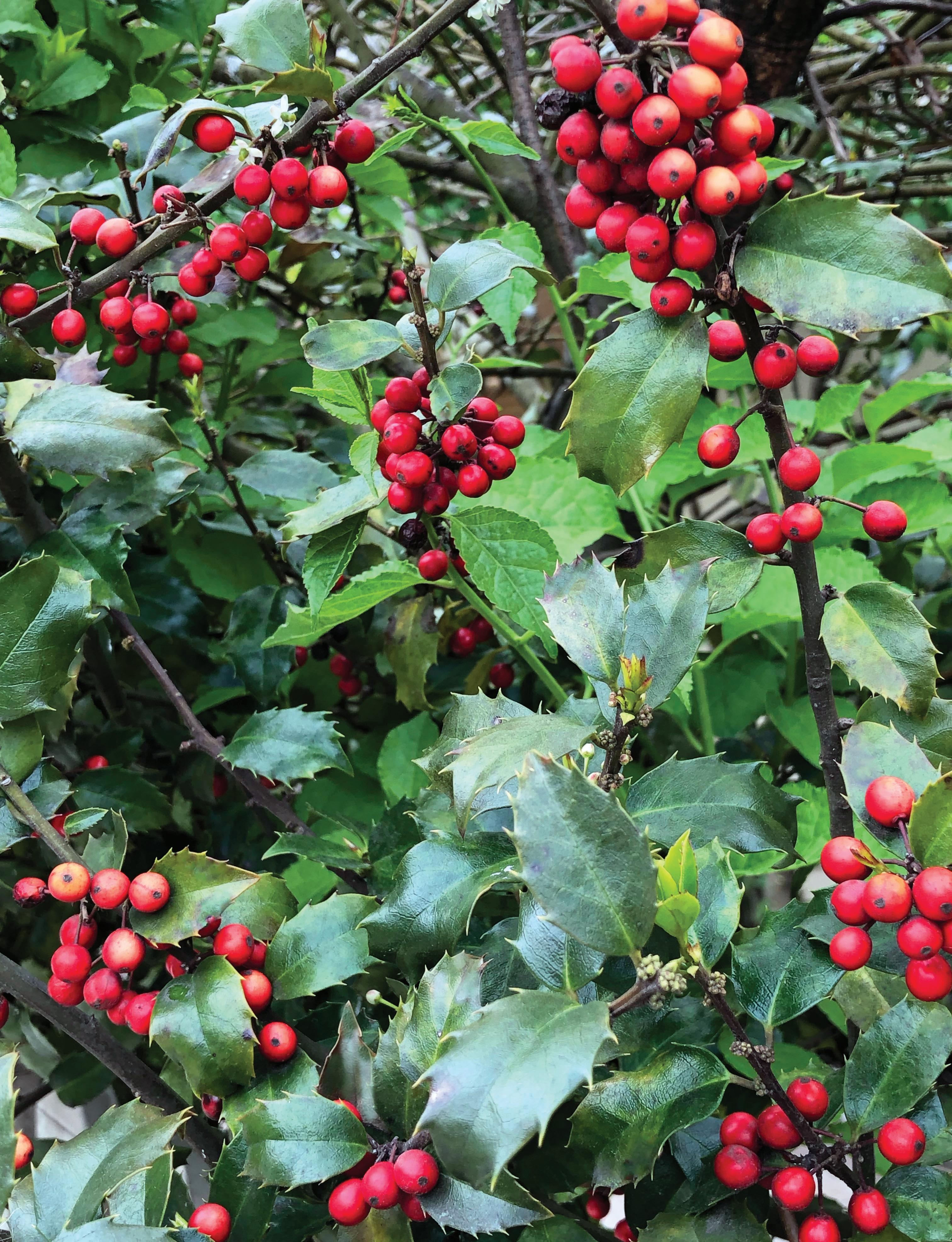
Pruning and care
Hollies used for hedging and in landscapes will need an occasional haircut.
Clockwise from right: Holly plants vary in the size of their leaves and quantity of berries. Birds often feed on berries from the American holly; bees are drawn to spring blooms; and birds also are attracted to the winterberry, Yaupon berry and inkberry varieties of holly.

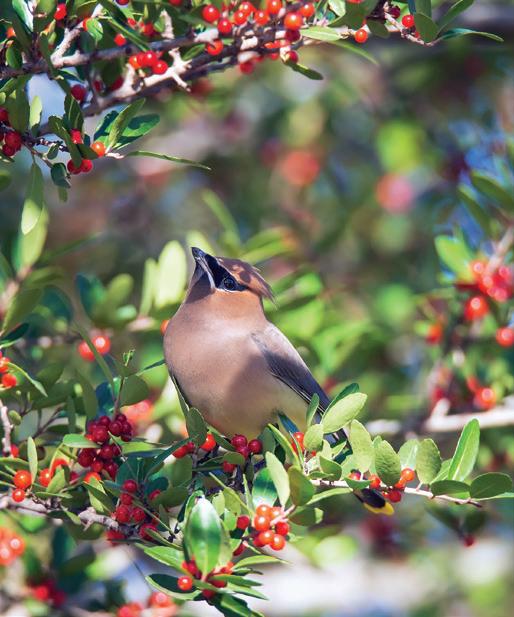
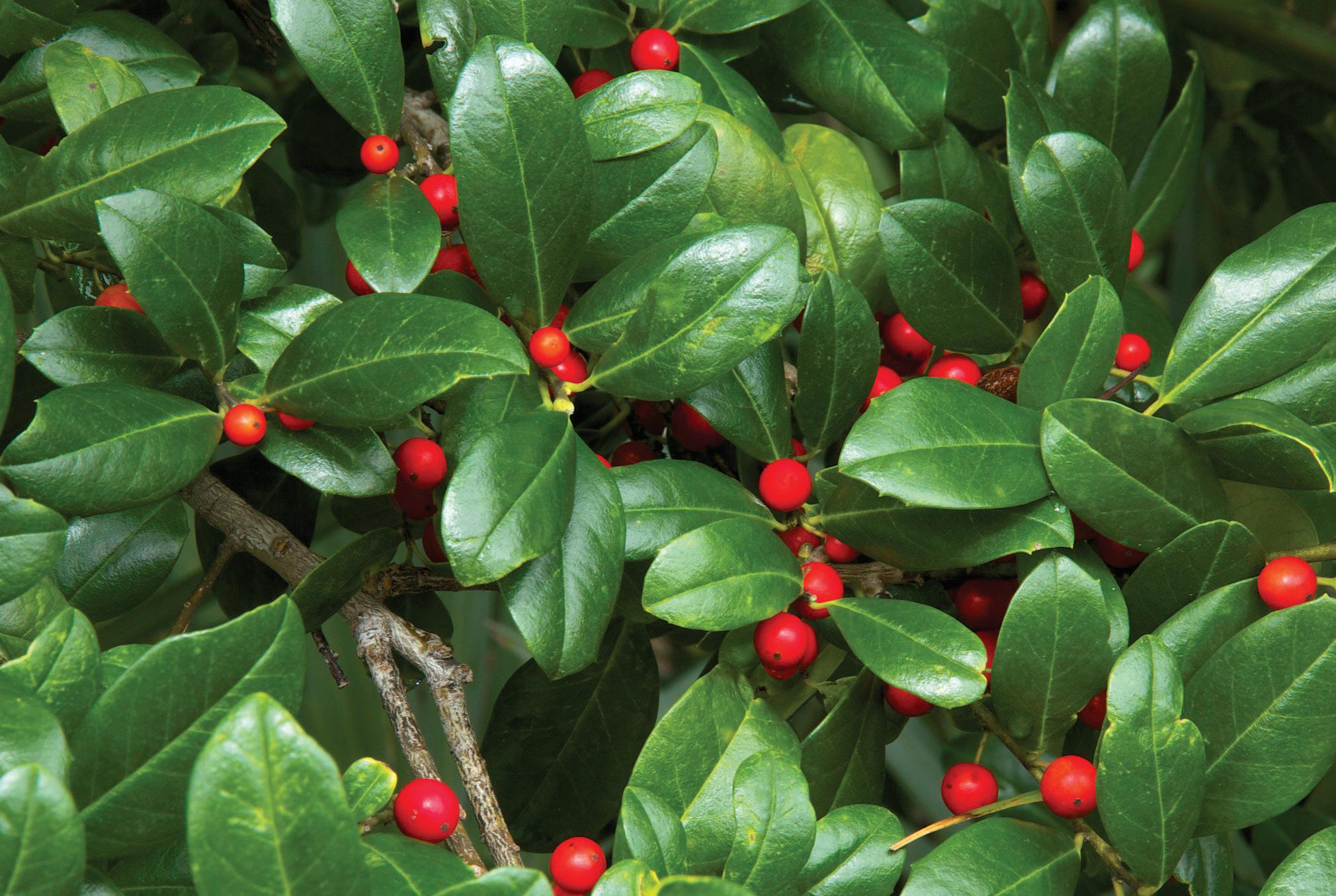
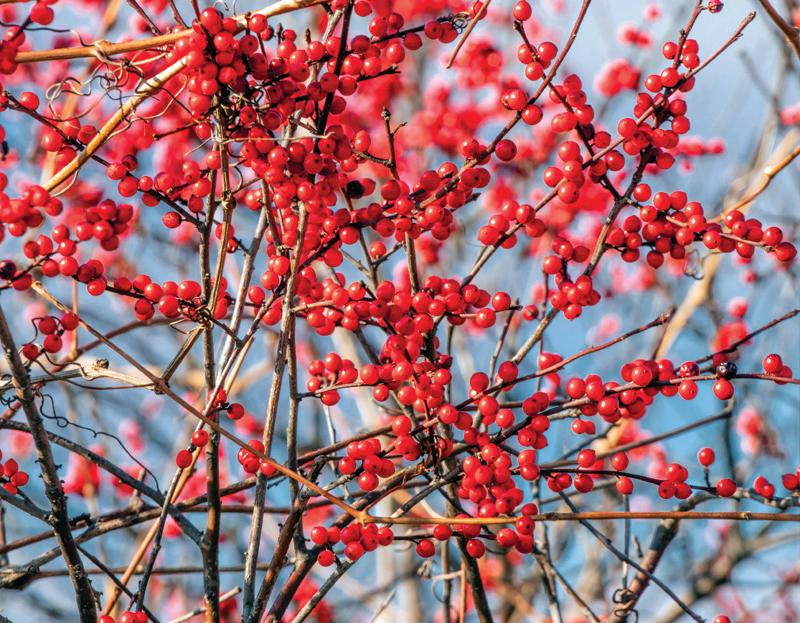
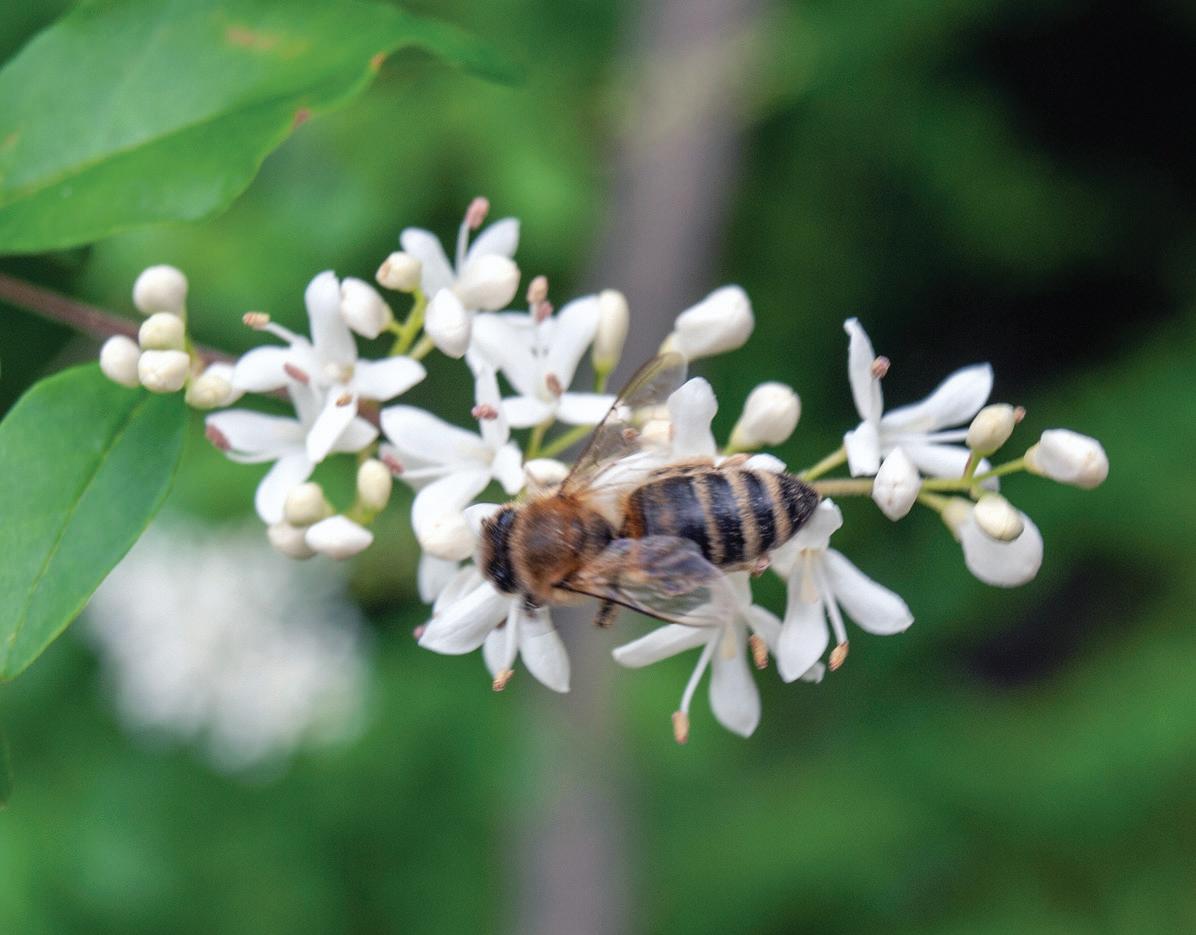
They may look edible, but they aren’t!
While birds and wildlife will make a meal of holly berries, people and pets should avoid them. They contain chemicals called saponins, which are toxic and can induce vomiting, dehydration and drowsiness.
“Pruning is done in the dormant winter season before new growth starts in March or so,” explained Mike Andruczyk, a Virginia Cooperative Extension horticulturist in Chesapeake. “There are a wide variety of sizes for hollies, and they’re also very free of pests and disease issues. With proper selection of the site and variety, you can have a great plant in your yard that requires very little extra care.”
Homeowners also can find smaller varieties for their landscapes.
“Dwarf selections of inkberry, yaupon and winterberry hollies fit easily in typical home gardens with at least 50% sun exposure and good drainage,” Andruczyk said.
For the birds and bees
Wildlife also can reap the benefits of hollies’ dense foliage.
“Cardinals, mourning doves, blue jays— they nest in these trees,” Viette said. “It’s not as easy for other animals and predators to get to them. Hollies really do hide the nests well.”
Andruczyk added that birds feed on holly berries and many, like the American, inkberry, sweet gallberry and yaupon, bloom in the spring with small cream-colored flowers and a honey-like fragrance.
“They’re excellent for bees,” he said. “In the autumn, the female plants—if pollinated—will have beautiful red, black, orange or yellow fruit that adds a seasonal interest and may attract cedar waxwings as they migrate south for the winter.”
Hollies require cross-pollination, so homeowners who want berries will need both female and male plants.
“You probably just need one male and can surround it with female plants,” Viette explained.
Medicare beneficiaries: Time to prepare for open enrollment
BY ADAM CULLER
The Medicare Annual Election Period is underway, which means it’s time for Medicare beneficiaries to start considering their 2022 coverage needs.
Medicare’s open enrollment period runs Oct. 15 through Dec. 7 and generally is the only time subscribers can change their Medicare Advantage or Part D coverage for the upcoming year.
During this time, beneficiaries can enroll in, withdraw from or switch Part D prescription coverage or Medicare Advantage Plans, also known as Medicare Part C. Any policy changes made during the Annual Election Period go into effect Jan. 1, 2022.
Gina Gentilini, senior individual account executive for Virginia Farm Bureau’s Health Insurance division, said customers should use the election period to determine whether their current coverage matches their medical needs.
When shopping for new Medicare Advantage or Part D plans, Gentilini noted customers should evaluate the potential use of the Medicare Advantage Plan they intend to enroll in, which will dictate their total out-ofpocket expenses for medical services.
Customers also are urged to consider the total cost of their prescription drugs through Medicare Advantage or Part D plans.
“The most important thing is to look at the overall picture of what that plan offers, and not so much what the premiums are and what the plan will cost you upfront,” Gentilini said. “Just because something may be cheaper premium-wise out of your pocket, it doesn’t mean it’s going to be cheaper overall when you’re using it.”
Those who turn 65 after the Medicare Annual Election Period still can obtain Medicare coverage for 2022. New beneficiaries can enroll during their Initial Medicare Enrollment Period, which starts three months before an individual’s 65th birthday, and concludes three months after.
To learn more about Medicare enrollment options, contact your local Farm Bureau office or call 800-2297779 to discuss Medicare Supplements, Medicare Advantage and Part D plans.
From big to small. From farm to front yard. As a Farm Bureau® member, you’re eligible to save.*
Platinum 1 savings for Farm Bureau® Members.
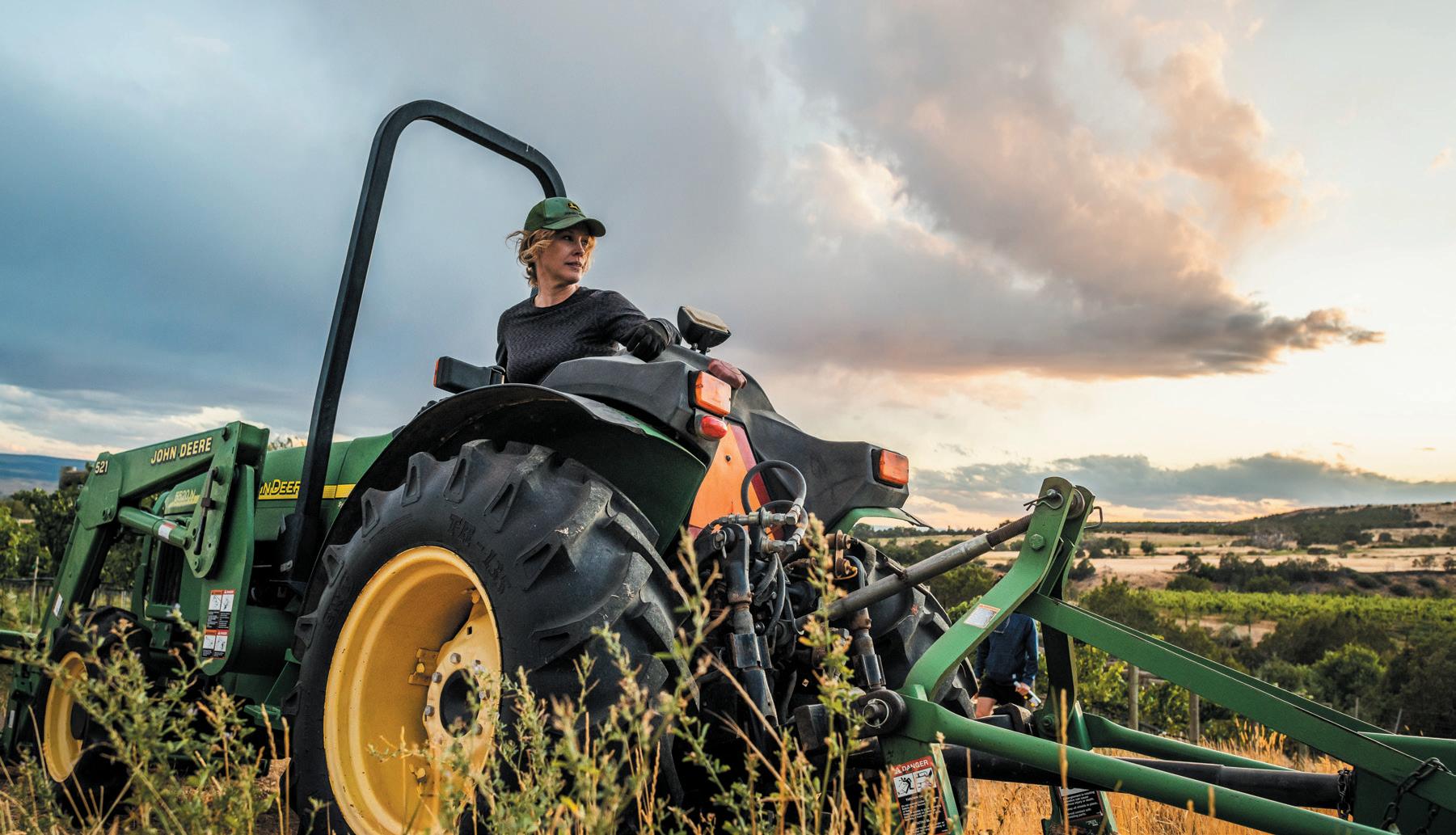
John Deere Rewards is happy to announce that all Farm Bureau Members* will automatically receive Platinum 1 status. That means instant savings on a wide range of John Deere products: from lawn tractors to skid steers, zero-turn mowers to utility vehicles, and more! Plus you’ll save money on Home & Workshop products. To find out more on how you can turn your loyalty into savings, go to JohnDeere.com/FarmBureau. Sign up today!
*Must be a valid member of Farm Bureau for 30 days and have a valid email address to be eligible for John Deere Rewards benefits. John Deere’s green and yellow color scheme, the leaping deer symbol, and JOHN DEERE are trademarks of Deere & Company.
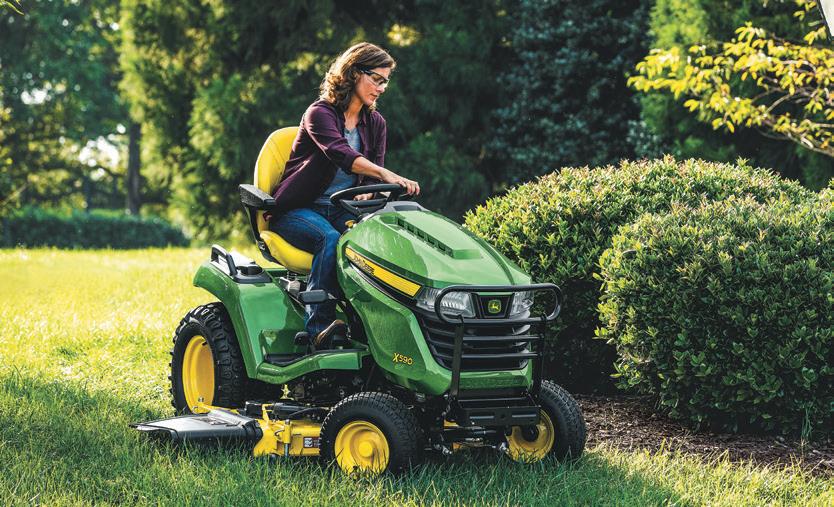
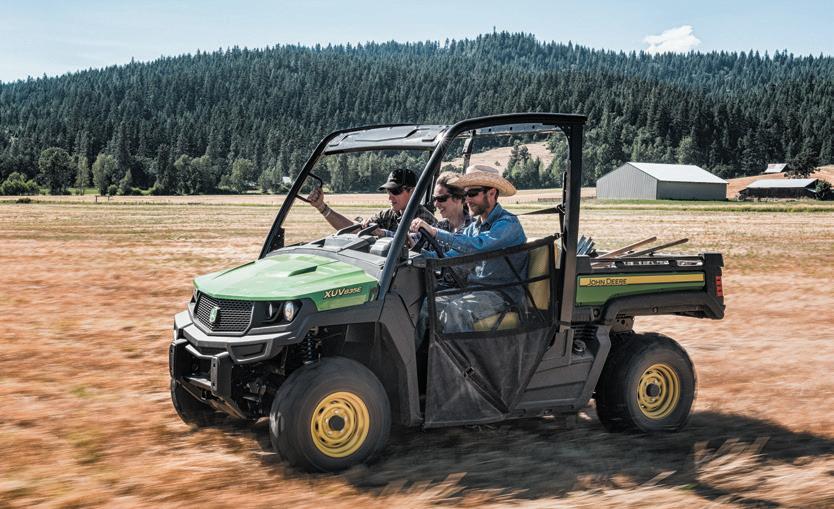




Forover40years,wehaveprovidedinnovativeproductsand exceptionalservicetoVirginiafarmoperationsandagribusinesses. OurBankandourteamaredeeplyrootedinthefarmingindustryandthatmakesustheright partnerforallofyouragriculturalfinancingneeds.


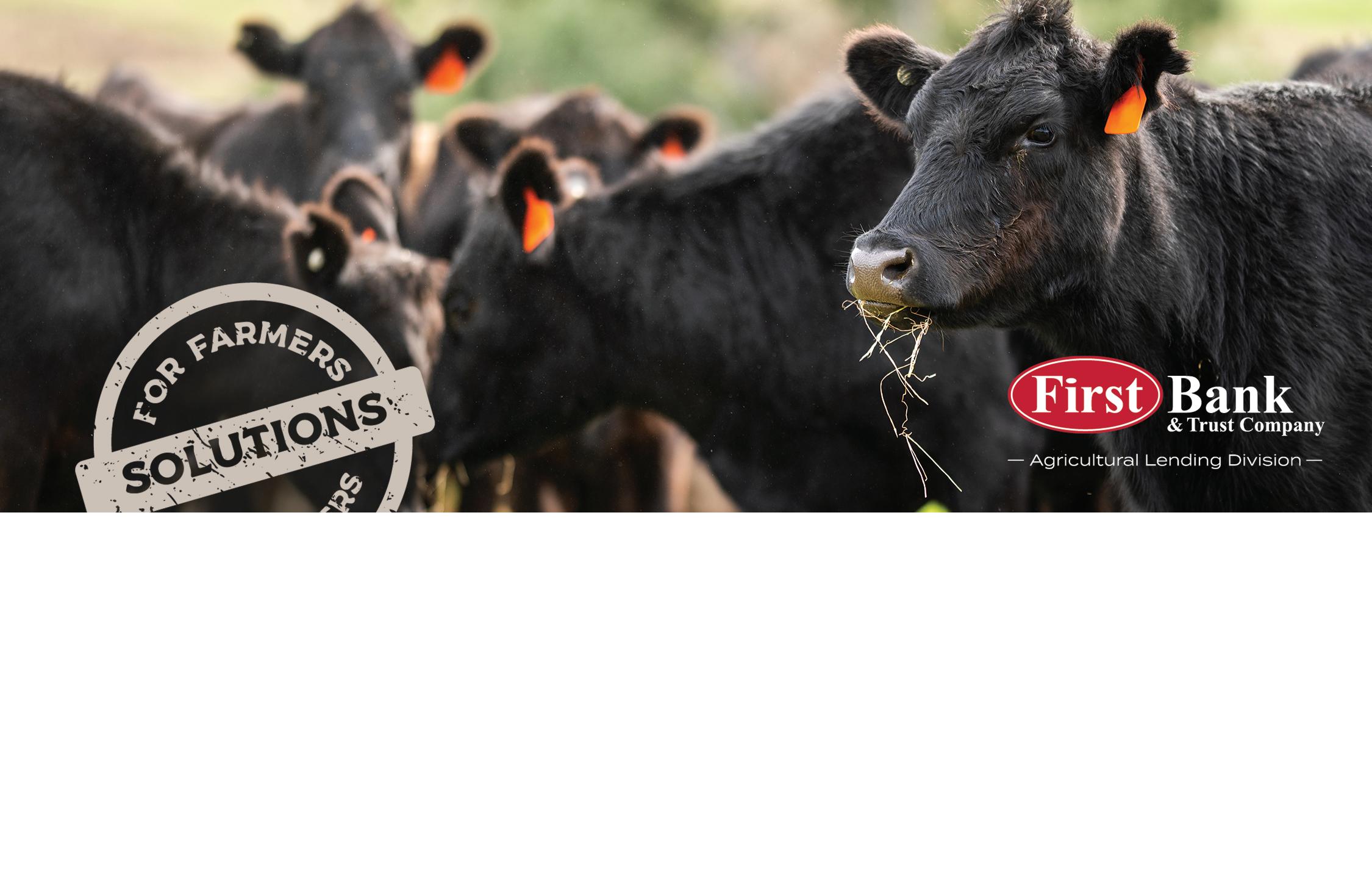
ShenandoahValley540.437.0604 • NewRiverValley540.583.5458•SWVirginia276.623.0128 EasternVirginia804.550.5700 MemberFDIC | www.firstbank.com/ag
Farm Bureau members receive $500 BONUS CASH *
ON ELIGIBLE NEW MAVERICK, RANGER, F-150 OR SUPER DUTY ® We are proud to offer exclusive savings to Farm Bureau® members and be the official truck of the Farm Bureau’s Young Farmers and Ranchers.
FORD SUPER DUTY FORD F-150 FORD RANGER

Computer-generated image with available features shown.
Don’t miss out on this offer. Visit FordFarmBureauAdvantage.com today!
*Farm Bureau Bonus Cash is exclusively for active Farm Bureau members who are residents of the United States. $500 Bonus Cash on the purchase or lease of an eligible new 2020/2021/2022 Ford Maverick, Ranger, F-150 or Super Duty.This incentive is not available on F-150 Lightning, F-150 Raptor, F-600, F-650 and F-750 Super Duty. This offer may not be used in conjunction with most other Ford Motor Company private incentives or AXZD-Plans. Some customer and purchase eligibility restrictions apply. Must be a Farm Bureau member for 30 consecutive days prior to purchase or lease and take new retail delivery from an authorized Ford Dealer’s stock by January 3, 2022. Visit FordFarmBureauAdvantage.com or see your authorized Ford Dealer for qualifications and complete details. Note to dealer: Claim in VINCENT using #37860. FORD MAVERICK
Claims texting service now available to VFB insurance customers
BY ADAM CULLER
Customers asked, and Virginia Farm Bureau Mutual Insurance Co. responded. A service that allows policyholders to receive claim updates via text messaging is now available.
The new texting service launched for all lines of business in mid-July, and all VFBMIC policyholders have access to this convenient feature when submitting a claim. The messaging system is powered by Hi Marley, a platform that connects customers to their insurance companies through intelligent text messaging.
“The idea really came from our customers, because a lot of times they wanted us to text them their claim numbers, information about their adjuster or other updates related to their claims,” shared Anne Baskette, VFBMIC director of claims administration.
“And while some of our agents and adjusters who have company cellphones could meet those requests, most of our claims are worked by office personnel who don’t have cellphones or the ability to text,” she explained. “That’s when we started looking for a platform that could help us text all of our customers and meet that growing demand.”
Baskette said VFBMIC’s search centered on finding an intelligent system that could offer more than those that simply send messages asking customers to call their claims adjusters for updates.
Customers will be asked if they want to receive text messages when calling in a claim, which is still a requirement despite the new texting integration. If so, they will automatically receive messages that provide their claim number, as well as information about their claims adjuster.
Additionally, customers will receive a message any time a payment has been

Virginia Farm Bureau insurance customers can now receive claims information via text messaging.
made on their claim. Any automated messages sent through the claims texting service will pertain only to an individual claim, and VFBMIC will never use the service to send customers information about its products.
Outside of receiving automated texts, policyholders also can utilize the messaging service to communicate directly with their adjuster instead of calling them. Through text, customers can obtain more information about their coverage, make an appointment to have their damaged property inspected, get updates on their claim status and more.
This level of personalized service typically is reserved for insurance companies that have a national presence, Baskette noted. In that regard, Virginia Farm Bureau is going above and beyond to provide its policyholders with exceptional customer service.
LEGAL
The annual meeting of policyholders of Virginia Farm Bureau Mutual Insurance Company will be held at 8:45 a.m., Thursday, December 2, 2021, at the Williamsburg Lodge, 310 South England Street, Williamsburg, VA, for the following purposes:
1. To receive and act upon the reports of the Company officers.
2. To elect a Board of Directors, each to serve a term of one year.
3. To transact such other business as may properly come before the meeting or any adjournments thereof.
Dated this 1st day of October, 2021.
Kathleen M. Early, Secretary
PAID ADVERTISEMENT
Have questions about Medicare Supplements? Call today!
Virginia Farm Bureau 1-800-229-7779
An authorized licensed insurance agent for Anthem Blue Cross and Blue Shield in Virginia, license number: 109534
This policy has exclusions, limitations and terms under which the policy may be continued in force or discontinued. For more information on benefits, please contact your agent or the health plan. Not connected with or endorsed by the U.S. Government or the federal Medicare program. The purpose of this communication is the solicitation of insurance. Contact will be made by an insurance agent or insurance company. Anthem Health Plans of Virginia, Inc. trades as Anthem Blue Cross and Blue Shield in Virginia, and its service area is all of Virginia except for the City of Fairfax, the Town of Vienna, and the area east of State Route 123. Independent licensee of the Blue Cross and Blue Shield Association. ANTHEM is a registered trademark of Anthem Insurance Companies, Inc. The Blue Cross and Blue Shield names and symbols are registered marks of the Blue Cross and Blue Shield Association. AADVOTH006M(15)-VA 55681VASENABS
Weathering winter
Take time to consider weather hazards and the condition of farm equipment and structures during the colder months
BY ADAM CULLER
As every farmer knows, the job may slow down in winter, but the work never stops.
Even when the ground is frozen over with snow and ice, there’s always something that needs to get done around the farm. Many farmers are conditioned to complete their chores as quickly as possible, but during the colder months, weather can complicate tasks that would otherwise be a breeze.
Rather than rushing through their work and risking injury, farmers should be mindful of pacing themselves when working in the winter weather.
“When it’s cold outside, our work is just going to take a little longer,” said Jonathan Grimes, chairman of the Virginia Farm Bureau Federation Young Farmers Safety Subcommittee.
“The biggest thing is remembering to take your time when you’re doing something,” he continued. “Your footing and traction aren’t going to be as good in the snow and ice, so whether you’re walking around or operating a piece of equipment, you need to slow down and really think the situation through.”
Grimes added farmers should always inspect their equipment before use, as melting snow and ice could make the machinery’s platforms slippery. Individuals also should always maintain three points of contact when mounting and dismounting equipment to avoid the risk of falling.
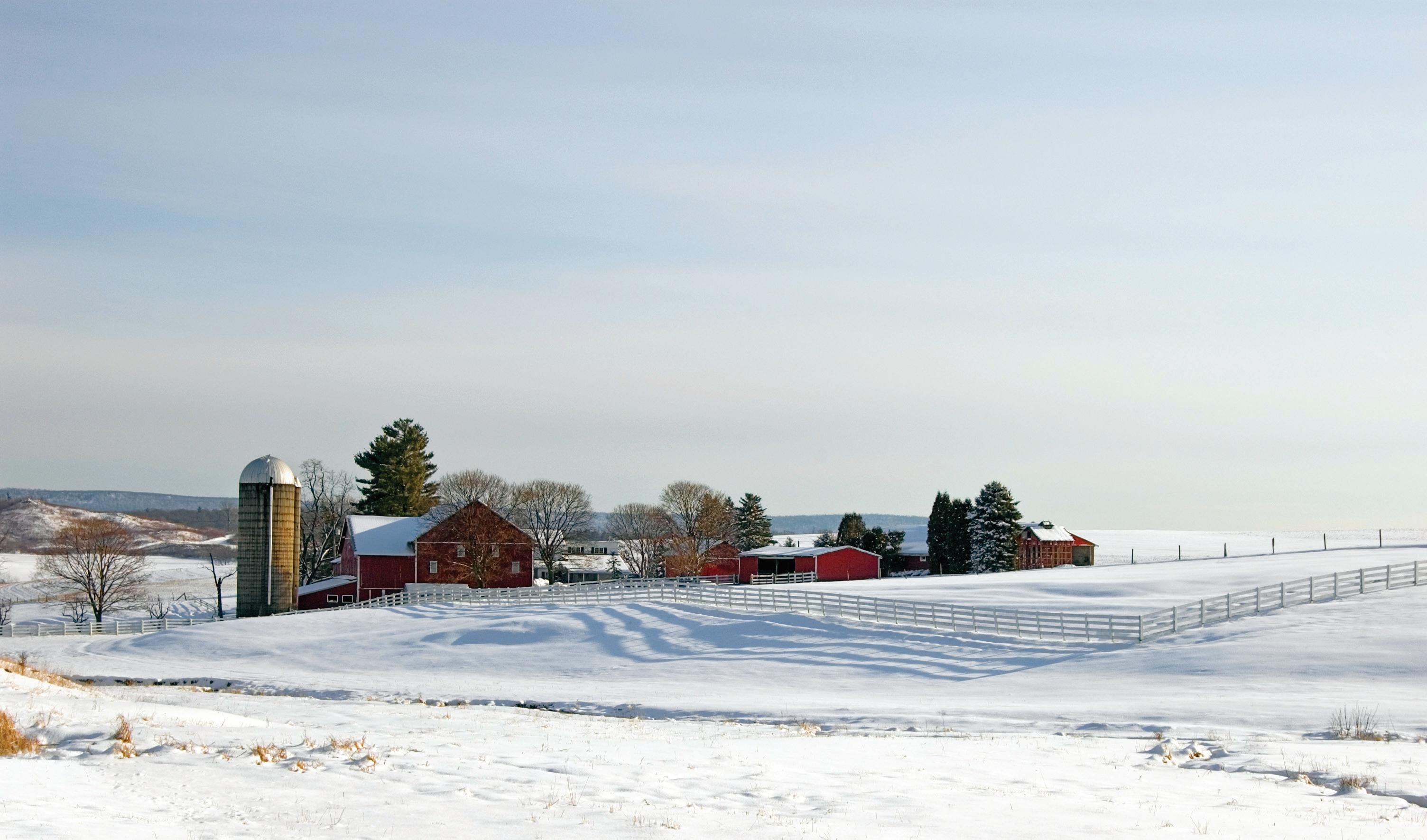
| WINTER WEATHER cont'd on page 27 »
Estate plan crucial to securing ownership of family farmland
BY NICOLE ZEMA
“It seems so complicated.”
“It’s too overwhelming to think about right now.”
“I’ll do it later.”
These are some of the excuses estate planning specialist P. Dianne Martin of Southern Farm Bureau Life Insurance Co. has heard from farmland owners and farm operators who delay establishing a formal succession plan. They mistakenly believe “everything will take care of itself” when they die, she said. Or they feel uneasy revealing details regarding their estate.
But proper estate planning can preserve family farmland and protect related businesses, securing those assets for current and future generations. When landowners neglect adequate estate planning, consequences can include the sale of assets to pay taxes; conflicts among heirs; unnecessary or excessive costs that reduce an estate’s value; and improper asset distribution.
“All parties need to meet face-to-
| ESTATE PLANNING cont'd from page 25 » face and discuss the challenges that land ownership brings, and make a plan, now!” said Martin, who works with Virginia Farm Bureau insurance agents to help farmers connect with reasonably priced attorneys. “The 2020 pandemic was a wake-up call for folks to make a plan. We never want to think something bad will happen, but don’t wait until the point you can’t make decisions.”
As one of their membership benefits, Farm Bureau members can meet with an estate planning specialist and receive a free, no-obligation analysis of their individual estate and retirement savings needs. More than 200 member families take advantage of the service each year.
“Planning should be reviewed when the dynamics of the family change,” Martin explained. “Or when the law changes. Ultimately, every estate is planned, if not by the owner, then by state and federal laws.”
Estate taxes threaten family farms
The 2017 federal Tax Cuts and Jobs Act included an exemption that requires an estate to file and pay taxes only when gross assets exceed $11.58 million per person. But this legislation will expire in 2025, dropping the exemption to $5.8 million after that.
Farming is a costly way of life, and so is death, when
PIZZA AND BINGE NIGHT…

ORDER OUT FOR LESS, ORDER OUT FOR LESS, WITH MEMBER DEALS PLUS WITH MEMBER DEALS PLUS
Log on to
https://memberdealsplus.accessdevelopment.com
When planning for the next generation, it’s important to keep communication lines open.
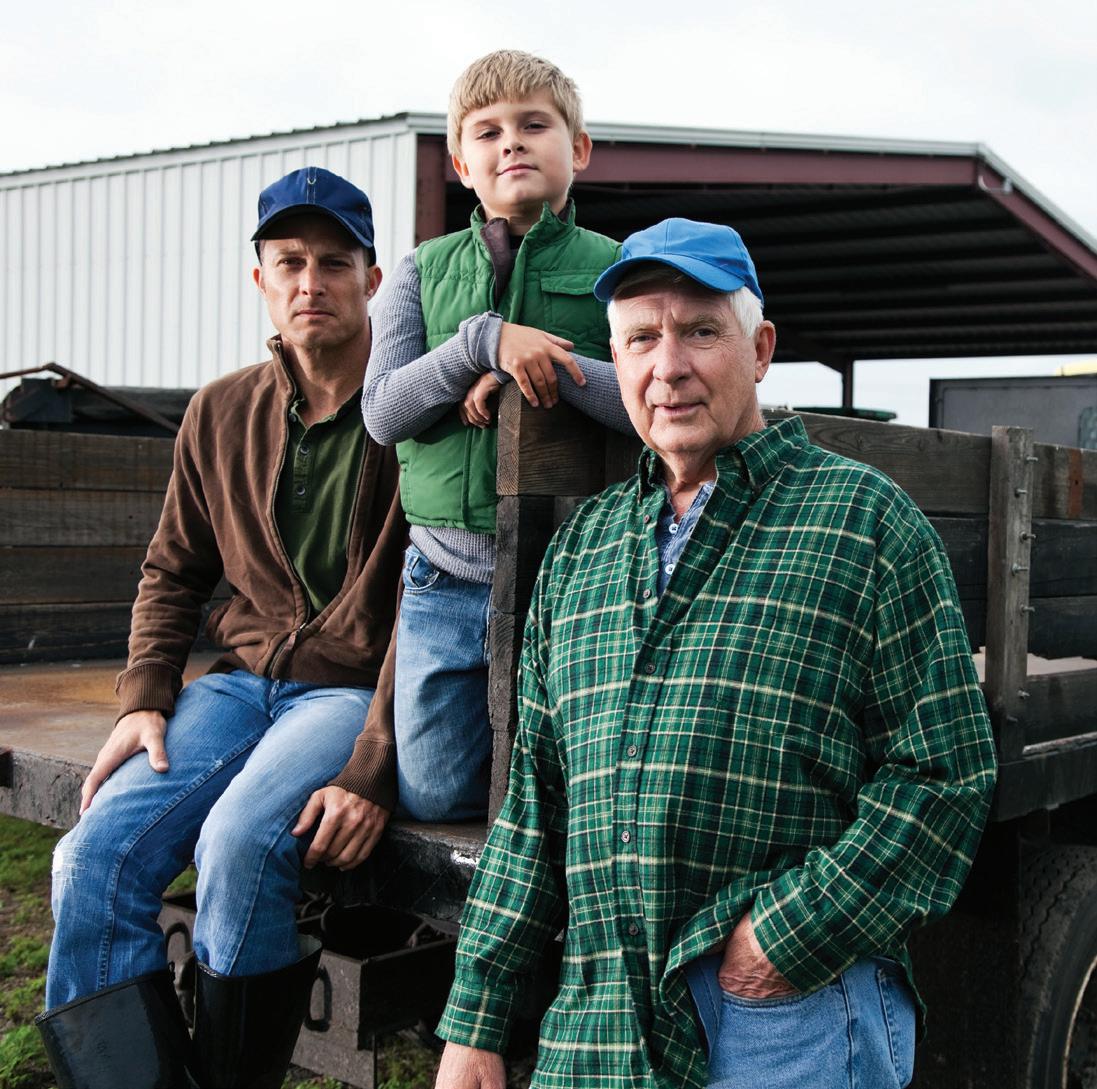
surviving family members are hit with estate taxes on the transfer of farmland and equipment. When those taxes exceed cash and other liquid assets, surviving family partners may be forced to sell property needed to keep the farm going.
American Farm Bureau Federation supports the Death Tax Repeal Act of 2021—U.S. House and Senate bills that would flat-out repeal the estate tax, or make the current $11.6 million exemption permanent.
Virginia’s agricultural advocates are encouraging congressional leadership to support the legislation.
Blacksburg farmer and entrepreneur Scott Sink, who serves as VFBF vice president, said the estate tax repeal would simplify complexities of generational property transfer that are burdensome to farm families and small businesses.
“I feel this legislation will help small businesses and family farms with continuity and planning as they move forward,” he said. With profit margins already tight, “having estate taxes out of the way is one less burden families or businesses have to face.”
Take the first step
The estate planning process begins with an in-depth inventory of asset values, and a general overview of heirs and intended asset distributions. Participants receive an analysis that examines potential tax liabilities resulting from several distribution plans. Legal and/or tax counsel generally are necessary in following up on analysis recommendations.
Your Farm Bureau insurance agent is your primary contact for estate planning services. Call your county Farm Bureau office today for more information.
| WINTER WEATHER cont'd from page 25 » Keep an eye on equipment, farm structures
Large farming equipment and structures often are among farmers’ largest investments, and keeping those assets safe throughout the winter takes some extra effort.
Scott DeNoon, farm product and underwriting manager for Virginia Farm Bureau Mutual Insurance Co., noted equipment should always be properly stored and shielded from the elements to avoid weather damage.
And, whenever farmers find some downtime, they should perform routine maintenance on their farming equipment. That way, machinery can be ready for spring planting.
According to DeNoon, collapses are among the most common farm insurance claims placed in winter. He encouraged farmers and other landowners to inspect and prepare their structures for winter weather as soon as possible.
“You’re going to want to inspect the roofs of any structures to make sure they’re sturdy enough to withstand the weight of accumulating ice or snow,” DeNoon said. “You also need to make sure doors, windows or gates on those structures— especially if they shelter animals—are in good structural condition now, and make sure repairs are done if needed.
“Making a repair is something you’re not going to want to be burdened with if there’s snow or ice on the ground, or if a winter storm is imminent.”
